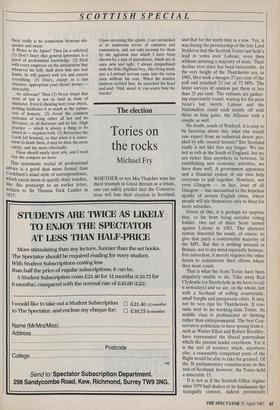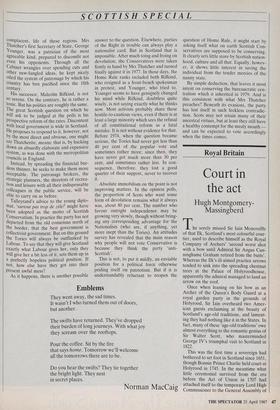The election
Tories on the rocks
Michael Fry
WHETHER or not Mrs Thatcher wins her third triumph in Great Britain as a whole, one can safely predict that the Conserva- tives will lose their election in Scotland, and that for the ninth time in a row. Yes, it was during the premiership of the late Lord Stockton that the Scottish Tories last held a lead in votes over Labour, even then without securing a majority of seats. Their decline ever since has been inexorable. At the very height of the Thatcherite era, in 1983, they took a meagre 27 per cent of the poll and returned 21 out of 72 MPs. The latest surveys of opinion put them at less than 25 per cent. The vultures are gather- ing expectantly round, waiting for the poor beast's last twitch. Labour and the Nationalists could each scuttle off with three or four gains, the Alliance with a couple as well. No doubt, south of Watford, it is easy to be facetious about this: what else would one expect from an industrial desert peo- pled by idle council tenants? But Scotland really is not like that any longer. We are not as rich as the South of England, but we are richer than anywhere in between. In establishing new economic activities, we have done well. A government apparatus and a financial system of our own help everyone to pull together. NOwhere, not even Glasgow — in fact, least of all Glasgow — has succumbed to the hopeless apathy of certain English cities, where people will stir themselves only to bleat for more subsidies.
Given all this, it is perhaps no surprise that, so far from being socialist voting fodder, two out of three Scots turned against Labour in 1983. The electoral system distorted the result, of course, to give that party a comfortable majority of the MPs. But this is nothing unusual in Britain, nor to my mind especially heinous. For correction, it merely requires the other forces to concentrate their efforts where they most count.
That is what the Scots Tories have been singularly unable to do. Take away Red Clydeside (or Strathclyde as we have to call it nowadays) and we are, on the whole, left with a Scotland of rolling countryside, small burghs and prosperous cities. It may not be very ripe for Thatcherism. It con- tains next to no working-class Tories. Its middle class is professional or farming rather than entrepreneurial. The best Con- servative politicians to have sprung from it, such as Walter Elliot and Robert Boothby, have represented the liberal paternalism which the present leader overthrew. Yet it is the sort of territory which, anywhere else, a reasonably competent party of the Right would be able to take for granted. Of the 38 parliamentary constituencies in this rest-of-Scotland, however, the Tories hold a miserable 15.
It is not as if the Scottish Office regime since 1979 had shaken to its fundament the tranquilly content, indeed provincially
SCOTTISH SPECIAL
complacent, life of these regions. Mrs Thatcher's first Secretary of State, George Younger, was a patrician of the most agreeable kind, prepared to discomfit not even his opponents. Through all the Cabinet wrangles over spending cuts and other new-fangled ideas, he kept nicely oiled the system of patronage by which his country has ben pacified since the 18th century.
His successor, Malcolm Rifkind, is not so serene. On the contrary, he is rather a tonic. But his politics are roughly the same. The great Scottish question on which he Will ask to be judged at the polls is his prospective reform of the rates. Discontent with local government is wide in Scotland. He proposes to respond to it, however, not by the most direct and obvious, one might say Thatcherite, means: that is, by hacking down an absurdly elaborate and expensive system, as was done with the metropolitan councils in England. Instead, by spreading the financial bur- dens thinner, he seeks to make them more acceptable. The patronage brokers, the strategic planners, the directors of recrea- tion and leisure with all their indispensable colleagues in the public service, will be able to carry on as before.
Talleyrand's advice to the young diplo- mat, `surtout pas trop de zeleP might have been adopted as the motto of Scottish Conservatism. In practice the party has not departed from the old consensus north of the border, that the best government is collectivist government. But on this ground the Tories will always be outflanked by Labour. To say that they will give Scotland exactly what Labour gives her, only they will give her a bit less of it, sets them up in a perfectly hopeless political position. If not, how else have they got into their present awful mess?
As it happens, there is another possible answer to the question. Elsewhere, parties of the Right in trouble can always play a nationalist card. But in Scotland that is impossible. After much toing and froing on devolution, the Conservatives were taken firmly in hand by Mrs Thatcher and turned finally against it in 1977. In those days, the Home Rule ranks included both Rifkind, who resigned as a front-bench spokesman in protest, and Younger, who tried to. Younger seems to have genuinely changed his mind while Rifkind, doubtless quite wisely, is not saying exactly what he thinks now. Most activists probably share these hostile-to-cautious views, even if there is at least a large minority which sees the refusal of all constitutional reform as a fatal mistake. It is not without evidence for that. Before 1974, when the question became serious, the Tories had never got less than 40 per cent of the popular vote and sometimes rather more; since then, they have never got much more than 30 per cent, and sometimes rather less. In con- sequence, therefore, they lost a good quarter of their support, never to recover it.
Absolute immobilism on the point is not improving matters. In the opinion polls, the proportion of Scots who want some form of devolution remains what it always was, about 80 per cent. The number who favour outright independence may be growing very slowly, though without bring- ing any corresponding advantage for the Nationalists (who are, if anything, yet more inept than the Tories). An attitudes survey has revealed that the main reason why people will not vote Conservative is because they think the party 'anti- Scottish'.
This is not, to put it mildly, an enviable position for a political force otherwise priding itself on patriotism. But if it is understandably reluctant to reopen the question of Home Rule, it might start by asking itself what on earth Scottish Con- servatives are supposed to be conserving. It clearly sets little store by Scottish nation- hood, culture and all that. Equally, howev- er, it shows little interest in saving the individual from the tender mercies of the nanny state.
By simple deduction, that leaves it most intent on conserving the bureaucratic cen- tralism which it inherited in 1979. And is this consistent with what Mrs Thatcher preaches? Beneath its evasions, the party has lost itself in such feckless contradic- tion. Scots may not retain many of their ancestral virtues, but at least they still have a healthy contempt for the mealy mouth and can be expected to vote accordingly when the times comes.



































































 Previous page
Previous page